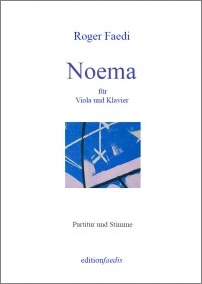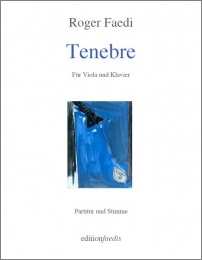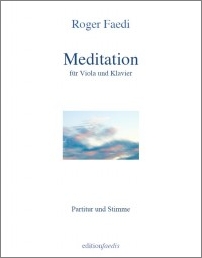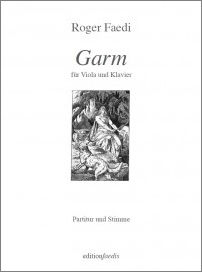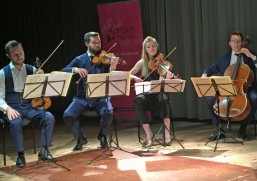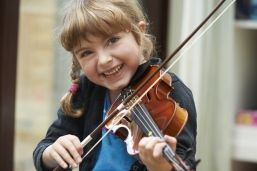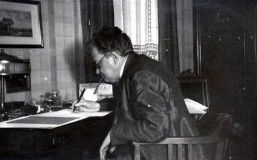
Roger Faedi - a versatile creative |
Konrad Ewald writes about Roger Faedi: «The teacher, songwriter, photographer, violist, crossbow archer and publisher, located in Basel, Switzerland, is one of the most creative individuals I know.»
Niklaus Rüegg - Roger Faedi, who is also a composer, will turn 80 years old in November 2018, and truly is one of the most versatile artists, a kind of a «homo universalis», combining music with visuals and literature. He studied literature, art history, philosophy and music history, however wanted to become a primary school teacher. In this role, he wrote musical and songs for kids, also acting as a publisher of the revolutionary, successful «Liederköfferli», a song collection which combines traditional and «new» song material.
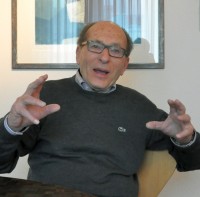
Since 1980 he has been researching synesthesia and publishing photo books. As a violist, he was active over a long time, as part of chamber music ensembles and orchestras. Composer Faedi takes his inspiration from paintings, photography and literature. Since 2005, he has been writing for small line-ups, with the viola playing an important role. In literature too, he prefers smaller dimensions. He likes to read poems and short essays with key statements, which are worth reflecting. His former teacher in German once told him: «I visit a gallery once a week, and read a poem a day». Faedi has been doing the same for 60 years.
His compositional oeuvre is characterized by the following: His chamber music contains calm phases, large interval jumps and sometimes surprising, fast passages, leading towards a climax. One of his most renowned works, «Licht und Schatten» for violin, viola and violoncello, written in 2016, adheres to said characteristics, however also contains graceful melodic elements.
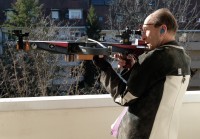
Faedi has been a crossbow archer for 30 years, trying, by internalizing the book «Zen in the Art of Archery», to reach the meditative state of Buddhist monks, which are said to be able to hit a target even in a dark room: «For me personally, the meditative thoughts are more important than thoughts on competition: It's not the archer that shoots, but the «it». The goal is to achieve complete concentration and unity with the crossbow and the self.»
Mr. Faedi, what's your composition process?
I use the computer. If I'm stuck, I'll use the piano. That's very practical. I only need paper at the beginning, in order to notate my sentiments, or create graphical sketches. The visuals are important influences. Tone and sound colors play a key role to me.
How would you place yourself stylistically?
I write in free tonality, however, despite the restraints of traditional harmony, I like to come back to it; maybe just to break free again. I am interested in the evolution of classical music. I've been visiting the IGNM concerts (International Society for New Music) since the age of 17. Isang Yun is an important composer to me, as is György Kurtag, even more so Heinz Holliger. His works contain an unbelievable wealth of colors. Being a primary school teacher was the ideal profession for me. I've been able to paint, create, model, develop language and make music with the kids. Since my retirement, I've been doing what I've always wanted to: Composing for small line-ups.
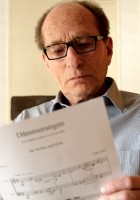
Did you always know who you wanted to become?
No, I didn't know it for a long time. I wanted to work in construction. As a boy, I built bridges and leaning towers. Languages were interesting too. I got influences in French from my mother, and Italian from my father.
How come you didn't study music?
I never wanted to. Music has been a central part since my childhood, however I wanted it to remain a personal joy. I probably would have become a violinist or violist, however it would have required lots of time and effort, which I wouldn't feel comfortable doing every day, such as playing in an orchestra, or teaching. I always had plenty of other interests, so that there wouldn't have been enough time to practice. I didn't want to waste my passion for music. I preferred staying an «amateur», and have always been a self taught composer. My only lessons in harmony came from Walther Geiser and my viola teacher Hans Brunner. Everything else I learnt by myself.
Many of your compositions are of rather dark and sometimes depressing quality. Do you share this impression?
That's true indeed. I tend to return to this path. The joyful elements in music aren't as easy to reach for me. I am a quite happy, open and life-loving, communicative guy, however I happen to resonate more with the dark moods in music. As a young boy, I had a skull on my desk, so to say as a Memento Mori.
Your music doesn't usually contain a driving rhythm throughout a work. It is rather characterized by interruptions and quick changes. Is this a conscious decision?
Absolutely. There's a personal connection here. I often become enthusiastic about something, then suddenly decide against it.
What's the fascinating part about viola for you?
Just like many others, I started on the violin. When hearing my teacher Hans Brunner playing the viola, I was immediately captured by the dark sound, containing more colors than the violin, for example muffled ones, as played by Kim Kashkashian, or bright ones, as played by Nils Mönkemeyer. The viola's large spectrum of sounds corresponds with my mood. The C string is immensely important to me.
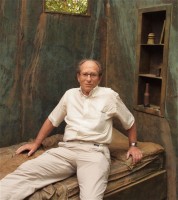
How would you describe the difference in sound to the cello?
I wouldn't want to draw a line, for the cello has an even bigger wealth of sounds. I am being honest: If I could be young once again, I would probably play the cello. Still, the viola remains the instrument that has shaped my life.
Do you still play?
I don't, but I used to play on a decent level, and together with great players. I wouldn't make it into university today, with my level back then. However back in time, my playing was good enough to join the conservatory orchestra.
Does playing the middle part make the viola that kind of «stepchild»?
The viola serves filling purposes in the orchestra, however it has an eminently important, connecting role. As a violist in orchestras and chamber music, I was able to experience the work much more on a holistic level, which wouldn't have been the case if I played the violin. It probably is no coincidence that many composers are violists, since the latter are said to have a good perception for orchestral elements.
The viola repertoire used to be limited, however in recent years, many viola pieces have been written. The «stepchild-existence» hasn't been a topic in 30 years.
You have written a lot of music for viola. Your three most recent pieces from 2018 all include the viola...
Yes, the pieces belong together. However, I also frequently write for winds, piano and voice. I don't quite fit the stereotype of a «viola composer».
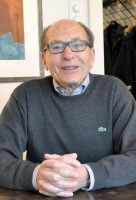
Foto: N.Rüegg
One of the three pieces, «Dialogue for viola and cello» demonstrates your preference for the combination of music, text and visuals: You track, in a musical way, a possible conversation history in the painting «Gespräch» (Dialogue) by Franz Anatol Wyss.
Said painting with interlacing figures sparked my interest, and I wondered what the depictured people would be talking about to each other. I also tried to transfer these moods, evoked by the painting, into another medium.
Do you see colors, when hearing specific notes?
No, that's not the case. I am not a synaesthete. It's rather the other way around, that I hear sounds when seeing pictures. I assign colors to moods. Blue, for example, is a rather dark mood for me.
You read at least one poem a day. How is your connection between language and music?
I have set to music many poems, for all vocal genres. It's a strength of mine. However, I have very high quality standards for poems. I have worked with French, German, Italian and Spanish texts. English isn't my forte. Occasionally, a poem inspires me to write an instrumental piece.
Where can your works be found?
Most of my works can be found, and in some cases bought, on my Website and here, on Music4Viola. That's great. However, the business side is secondary to me. I am happy to be able to say that something has worked out.
Do you have any favorites amongst your own works?
Here are a few:
-
Dea, three miniatures for Piano (2004)
-
a due, for Flute and Oboe (2012)
-
Sechs Lieder, based on poems by Giorgio Orelli for Baritone, Oboe and Cello (2014)
-
Sei la terra e la morte, after the poem of the same name by Cesare Pavese
for Tenor, two Violins, Viola and Cello (2014) -
November for Alto, Viola, Violoncello after a poem by Wilhelm Münger (2014)
-
Licht und Schatten, for Violin, Viola and Cello (2016)
Mr Faedi, thank you very much for the interview!
Useful links:
» To the sheet music of Roger Faedi in the online shop to browse through (as print or download)
» To the composer profile of Roger Faedi
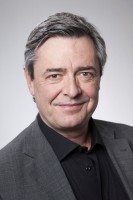
Niklaus Rüegg
This blog article is written by Niklaus Rüegg, graduate of the Zurich International Opera Studio, graduate of the Basel Opera Academy, twice winner of the Migros Gifted Scholarship, numerous engagements in opera, operetta, musicals and concerts in Switzerland and abroad.
Rüegg has also been working as a music journalist for ten years and is responsible for the association pages of the VMS (Verband Musikschulen Schweiz) in the Schweizer Musikzeitung.
As a young man, Niklaus Rüegg had played the violin and viola.
Available in our online shop |
» To Tenebre by Roger Faedi
» To Meditation by Roger Faedi » To Garm by Roger Faedi
Don't miss any Violablogs |

» Subscribe to our Newsletter for free
| Could also be of interest to you |
» Exercise or talent?
» Rediecovered: Alexander Presuhn
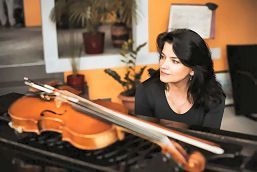
» Natalia Wächter - The interview
|
|
 Visit and like us on Facebook.
Visit and like us on Facebook.» Music4Viola on Facebook
